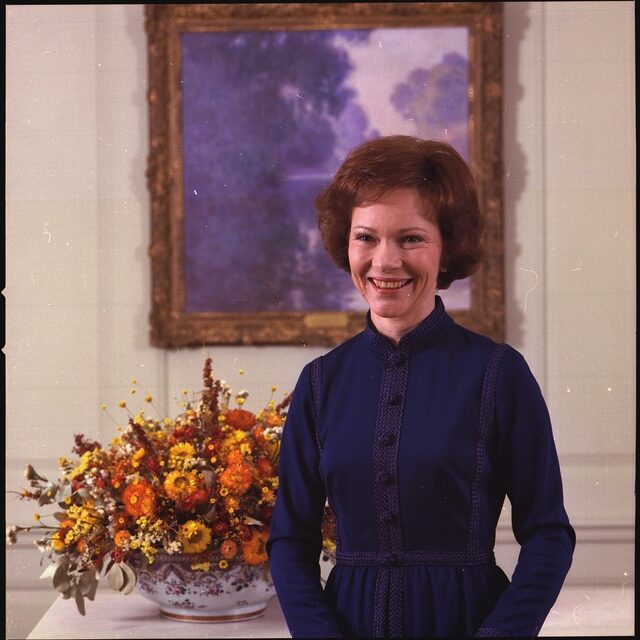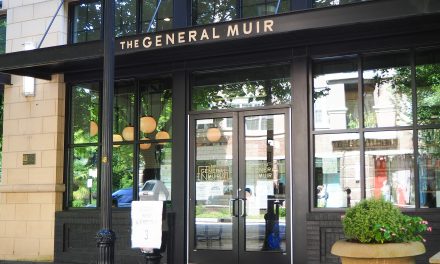Former Emory University Department of Women’s Studies Distinguished Fellow and First Lady Rosalynn Carter died on Nov. 19, two days after the Carter Center announced that she entered hospice care. She was 96 years old. Rosalynn Carter, the wife of former United States President and Emory University Distinguished Professor Jimmy Carter, is survived by her husband and their four children, Amy, Donnel, Jack and James Carter.
In a Nov. 19 statement, the Carter Center said that the former first lady “died peacefully, with family by her side.”
In May, the Center announced that Rosalynn Carter had been diagnosed with dementia and continued “to live happily at home” alongside her husband, who entered hospice care in February.
Rosalynn Carter had a 40-year relationship with Emory through the Carter Center, which she founded with her husband in 1982 in collaboration with the University. Today, the Carter Center has worked to advance peace and health across more than 80 countries.
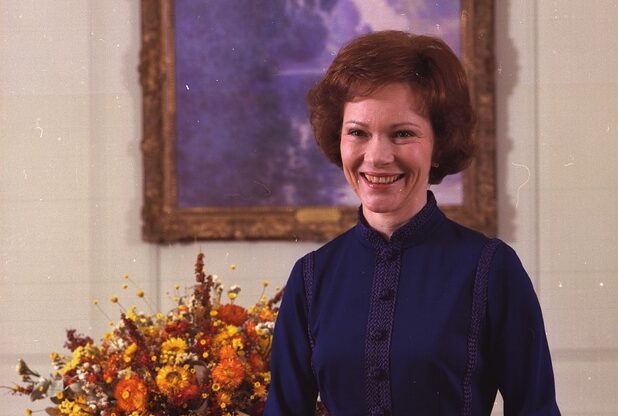
Former First Lady Rosalynn Carter died on Nov. 19. She founded the Carter Center alongside her husband, former U.S. President Jimmy Carter, and was dedicated to mental health advocacy. Courtesy of Wikimedia Commons
University President Gregory Fenves called Rosalynn Carter a “dear friend of Emory” in a Nov. 19 social media post.
“Her wisdom, determination, and kindness were evident in all that she did,” Fenves wrote in the post. “We are grateful for her many contributions and proud to have partnered with her on historic work in mental health.”
Before working at Emory, Rosalynn Carter made her mark on the White House as the first lady of the U.S., beginning her term when Jimmy Carter was elected president in 1976. Carter, whom she married in 1946, served one term from 1977 to 1981.
During her tenure in the White House, Rosalynn Carter was a dedicated mental health advocate. She served as an active honorary chair on the Presidential Commission on Mental Health, which worked to pass the Mental Health System Act of 1980 to provide grants to community mental health centers.
Rosalynn Carter continued her work surrounding mental health at the Center, where she established and chaired for the Carter Center’s Mental Health Task Force. She also led the Carter Center Mental Health Program until her retirement, working hand-in-hand with Emory’s psychology and psychiatry departments, as well as the Rollins School of Public Health and Nell Hodgson Woodruff School of Nursing.
Fenves addressed the program’s connection to the University in a Nov. 20 email to the Emory community, noting that Rosalynn Carter made “many important connections” across campus during her time in the public eye.
“Mrs. Carter turned to Emory experts on a regular basis in her efforts to advance access to care and parity in insurance coverage for those struggling with mental illness and to create support systems for both patients and caregivers,” Fenves wrote.
Using the Carter Center’s connections to spark discussions among health leaders and organizations, the Carter Center Mental Health Program aims to raise awareness about mental health to reduce stigma and discrimination.
In line with this goal, Rosalynn Carter established the Rosalynn Carter Fellowships for Mental Health Journalism in 1996 to train journalists from around the world to accurately report on mental health and break down stigma through storytelling.
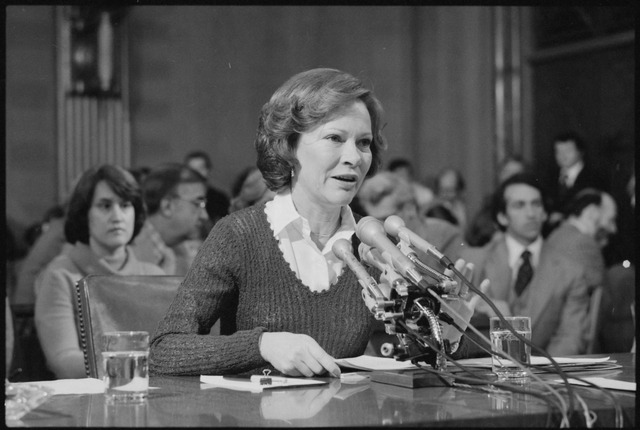
Former First Lady Rosalynn Carter testifies before the U.S. Senate Subcommittee on Heath and Scientific Research on behalf of the President’s Commission on Mental Health in 1979. Courtesy of Wikimedia Commons
In the Nov. 20 email, Fenves wrote that Rosalynn Carter’s work to reduce stigma around mental health was among the most “enduring lessons she demonstrated,” adding that her dedication to the cause “benefited individuals and communities the world over.”
“Her wisdom, determination and kindness were evident in all that she did,” Fenves wrote. “We are deeply grateful for her many contributions and proud to have partnered with her on historic work in mental health.”
The program also works to inform public policy supporting mental health care equity. From 1985 to 2016, the Carter Center hosted the annual Rosalynn Carter Symposium on Mental Health Policy to bring together national leaders in mental health to discuss promoting behavioral health care accessibility and quality.
In 2007, Rosalynn Carter testified before a U.S. House of Representatives subcommittee in favor of the Paul Wellstone and Pete Domenici Mental Health Parity and Addiction Equity Act, which was passed in 2008 to require insurance plans to cover mental illnesses at parity with other illnesses.
Georgia Southwestern State University, Rosalynn Carter’s alma mater, established the Rosalynn Carter Institute for Caregivers in her honor in 1987. Rosalynn Carter served as the president of the board of directors for the institute, which aims to support all caregivers, including those who take care of their family members without pay.
Rosalynn Carter went on to write several books about caregiving and mental health, such as “Helping Someone with Mental Illness,” which won the 1999 American Society of Journalists and Authors Outstanding Book Award in the service category.
This became one of many awards Rosalynn Carter earned throughout her life — her accolades include the Volunteer of the Decade Award from the National Mental Health Association, the United States Surgeon General’s Medallion and the Presidential Medal of Freedom, the nation’s highest civilian honor. She was inducted into the National Women’s Hall of Fame in 2001.
Rosalynn Carter’s dedication to health extended beyond psychology. She was a strong advocate for childhood immunization and worked with former First Lady of Arkansas, Betty Bumpers, to establish Every Child by Two — now known as “Vaccinate Your Family” — in 1991. The nonprofit raises awareness about the importance of timely childhood vaccines and works to make immunizations more accessible.
The Atlanta Project, a program at the Carter Center dedicated to “addressing the social ills associated with poverty and quality of life citywide,” was established the same year. Rosalynn Carter served on the project’s Policy Advisory Board until it was transferred to Georgia State University in 1999.
The former first lady also went on to work as a distinguished centennial lecturer at Agnes Scott College (Ga.) from 1988 to 1992 and a distinguished fellow in Emory’s department of women’s studies from 1990 to 2018.
During that time, Rosalynn Carter and her husband were heavily involved in life at Emory. She formed a working relationship with Samuel C. Dobbs Professor of Biology Jaap de Roode, who garnered international attention after discovering that monarch butterflies use medicinal plants to treat their offspring for disease in 2010. The two discussed butterfly conservation over lunch, and de Roode later invited Rosalynn Carter and Jimmy Carter to visit his laboratory and join his lab members on a trip to Mexico’s Monarch Butterfly Biosphere Reserve in 2012.
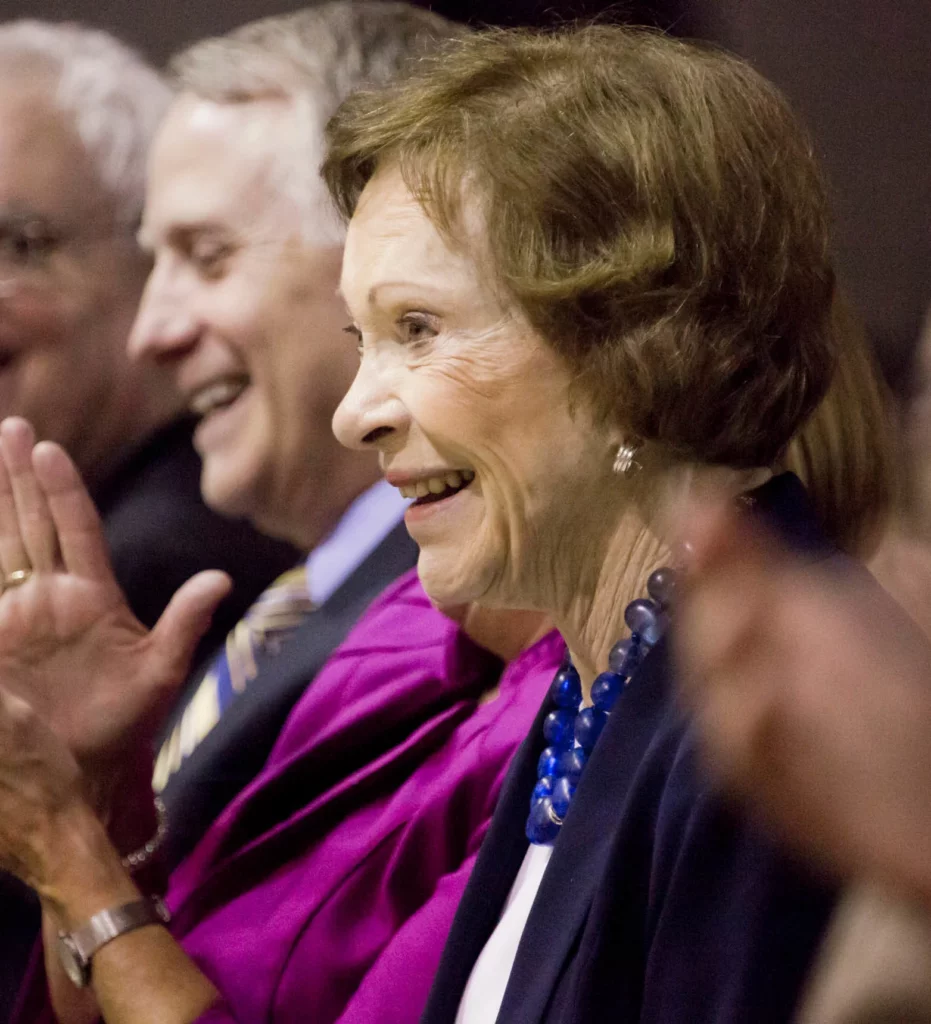
Former First Lady Rosalynn Carter sits next to former University President James Wagner during an annual Carter Town Hall. Courtesy of Emory Photo/Video
Rosalynn Carter ultimately co-founded the Rosalynn Carter Butterfly Trail to increase habitation for monarchs and other pollinators and made efforts to educate the public about butterfly-friendly gardens. De Roode serves on the board of directors and said the organization has helped people build over 3,000 gardens to support monarch butterflies and other pollinators.
Working with Rosalynn Carter was a “wonderful experience,” de Roode said, adding that she was down-to-Earth and friendly like a “regular grandmother.” He explained that it was inspirational to watch her embark on an initiative to help pollinators after spending her career doing the same for people struggling with mental health issues or infectious diseases.
“It’s just impressive that someone like her who has done so many things for so many people, took on yet another thing in her life to, in this case, really stand up for nature and creatures that cannot support themselves,” de Roode said. “She gave voice to those who feel powerless or are powerless.”
The Rosalynn Carter Butterfly Trail will continue to build pollinator habitats to keep the former first lady’s legacy alive, de Roode said. He remembered that she brought out the best in people and pushed everyone around her to do their best work.
“She was always very grateful,” de Roode said. “She really appreciated and made that clear to people that they were valued.”
In 2014, de Roode and his students were among the many volunteers who helped establish the Jimmy and Rosalynn Carter Pollinator Garden at the Carter Center, which was a 90th birthday present for the former president.
“Rosalynn was my equal partner in everything I ever accomplished,” Jimmy Carter said in the Carter Center’s statement. “She gave me wise guidance and encouragement when I needed it. As long as Rosalynn was in the world, I always knew somebody loved and supported me.”
Update (11/19/23 at 7:07 p.m.): This article was updated to include information from University President Gregory Fenves’ Nov. 19 social media post.
Update (11/20/23 at 12:04 p.m.): This article was updated to include information from University President Gregory Fenves’ Nov. 20 email to the Emory University community.
Update (12/4/23 at 10:45 a.m.): This article was updated to include comment from Samuel C. Dobbs Professor of Biology Jaap de Roode.
Madi Olivier is from Highland Village, Texas, and is majoring in psychology and minoring in rhetoric, writing and information design. Outside of the Wheel, she is involved in psychology research and works for the Trevor Project. In her free time, you can find her trying not to fall while bouldering and watching Criminal Minds with her cat.

